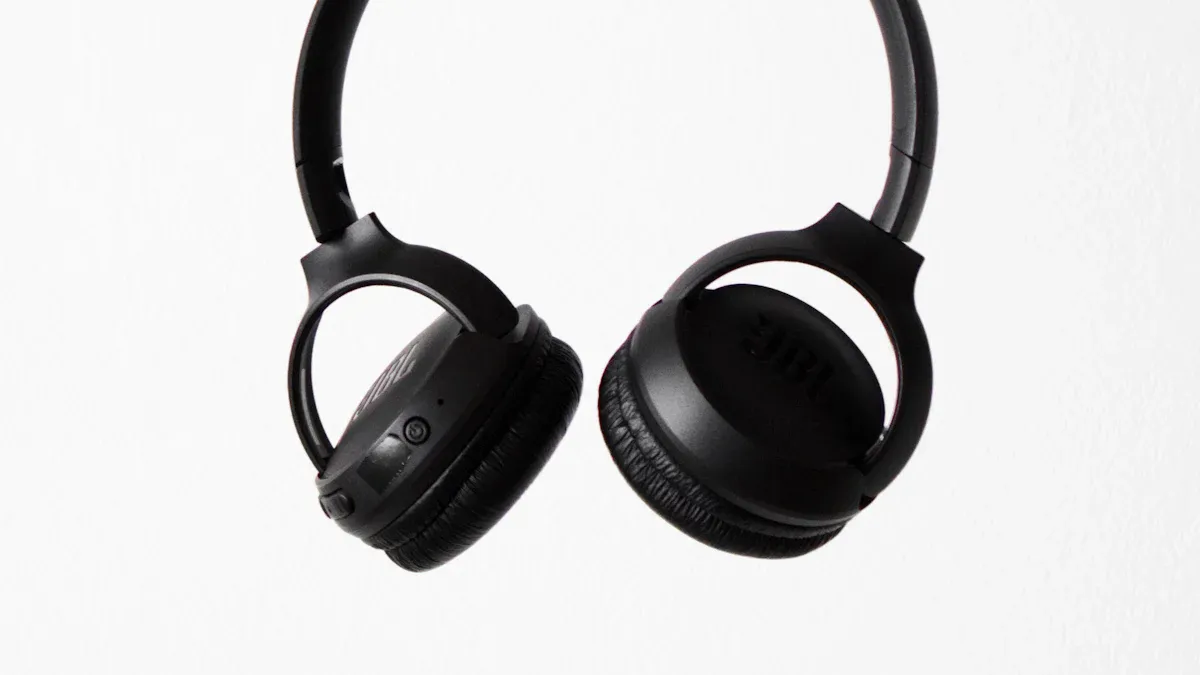Choosing the right headphone supplier can define the success of your business. A reliable supplier ensures consistent product quality, which directly boosts customer satisfaction. For example, 55% of consumers are willing to pay extra for personalized audio features. This highlights how suppliers offering customization options can help you cater to modern consumer demands effectively. Moreover, the market for customizable headphones is expected to grow by 20.1% by 2025, showcasing a growing trend toward tailored solutions.
When choosing headphones for your business, consider factors like high sound quality, noise cancellation features, and a comfortable fit. These aspects are especially important for headphones for work calls or delivering a premium audio experience. Partnering with the right supplier not only helps you meet these expectations but also builds trust with your customers. Reliable suppliers often provide headphone recommendations tailored to your market, ensuring long-term growth and success.
Identifying Your Needs
Understanding Your Target Audience
To choose the best headphones for your business, you must first understand your target audience. Different groups have unique preferences and priorities when it comes to audio products. For instance, millennials and Gen Z value sound quality, with 66% stating it significantly impacts their listening experience. Audiophiles, on the other hand, actively seek high-resolution or lossless audio products. Professionals like content creators often prioritize high-resolution headphones for their work.
The table below highlights key insights into various demographic groups and their preferences:
| Demographic Group | Key Statistic/Insight |
|---|---|
| Millennials and Gen Z | 66% believe sound quality significantly affects their listening experience. |
| Consumers aged 18-34 | 45% have purchased high-end headphones in North America. |
| Audiophiles | 60% actively seek high-resolution or lossless products. |
| Tech-savvy individuals | 30% are familiar with advanced wireless transmission technologies. |
| Global sales regions | North America and Europe accounted for over 70% of global sales in 2023. |
| Professional sector | Content creators make up about 25% of the market share for high-resolution headphones. |
By identifying these preferences, you can align your product offerings with what your audience values most.
Choosing the Right Headphones for Your Market
Choosing the right headphones for your market requires balancing features and functionality. For example, professionals often need headphones with noise cancellation and superior sound clarity for work calls or editing tasks. Meanwhile, headphones for music enthusiasts should deliver deep bass and crisp treble.
The global headphone market analysis shows shifting trends in product popularity. In 2022, wireless headphone shipments decreased by 2%, with total sales reaching 287.7 million units. While the TWS (True Wireless Stereo) segment previously drove growth, it saw a 23% decline. Conventional wireless in-ear headphones dropped by 36%, and on-ear devices fell by 25%. These trends suggest that wired and wireless options should be carefully evaluated based on your audience’s preferences.
Setting a Budget for the Best Headphones for Professionals
Setting a budget is crucial when sourcing the best headphones for professionals. High-quality headphones often come with a higher price tag, but they also offer better durability and performance. Proactive supplier management can help you find cost-effective options without compromising quality. Vendor analysis and supplier evaluation metrics are essential tools for aligning your budget with your business needs.
Consider bulk purchasing to reduce costs. Many suppliers offer discounts for large orders, which can help you stay within budget while meeting demand. Additionally, factor in shipping costs and delivery times to avoid unexpected expenses.
Tip: Always prioritize value over price. Investing in durable, high-performance headphones can save you money in the long run by reducing replacement and repair costs.
Evaluating Supplier Credibility
When choosing a headphone supplier, evaluating their credibility is essential. A credible supplier ensures you receive high-quality products and reliable service. This section will guide you through the key steps to assess a supplier’s trustworthiness.
Verifying Certifications and Compliance
Certifications and compliance documents demonstrate a supplier’s commitment to quality and safety standards. Always request proof of certifications like ISO 9001 for quality management or CE marking for compliance with European safety standards. These certifications ensure the headphones meet industry regulations and are safe for use.
For gaming headphones, check if the supplier adheres to specific audio standards. For example, certifications related to sound quality and low latency are crucial for delivering an immersive audio experience. Suppliers who comply with environmental regulations, such as RoHS (Restriction of Hazardous Substances), also show responsibility toward sustainability.
Tip: Ask for documentation upfront. A trustworthy supplier will provide these without hesitation.
Checking Reviews and Testimonials
Customer reviews and testimonials offer valuable insights into a supplier’s reliability. Look for feedback on product quality, delivery times, and customer service. Platforms like Trustpilot or Google Reviews can help you find unbiased opinions.
Pay attention to reviews from businesses in your niche. If you’re sourcing gaming headphones, check if other buyers mention features like sound clarity or durability. Positive feedback about an immersive audio experience indicates the supplier delivers on their promises.
You can also reach out to previous clients for direct feedback. Ask about their experience with the supplier, including any challenges they faced. This step helps you make an informed decision.
Assessing Market Reputation and Experience
A supplier’s market reputation reflects their reliability and expertise. Research how long they have been in the industry and their track record with similar businesses. Experienced suppliers often have a deeper understanding of market trends and customer needs.
For example, a supplier specializing in gaming headphones should know the latest features gamers demand, such as surround sound or noise cancellation. Their ability to provide products that enhance an immersive audio experience shows their expertise.
Note: Suppliers with a strong reputation often have partnerships with well-known brands. This can be a good indicator of their credibility.
Assessing Product Quality
Reviewing Materials and Build Standards
The materials and build standards of headphones directly impact their durability, comfort, and overall audio quality. When evaluating a supplier, you should examine the materials used in the headphone’s construction. High-quality materials, such as aluminum or reinforced plastics, ensure the headphones can withstand daily wear and tear. Additionally, soft ear cushions and adjustable headbands enhance user comfort, making them suitable for extended use.
Suppliers often provide certifications to validate the quality of their materials. For instance, AQI Service conducts safety tests throughout the production cycle, from raw materials to finished products. The UL HD Quality Mark is another certification that verifies claims of HD audio quality, distinguishing genuine high-definition headphones from marketing gimmicks. The table below highlights key certifications to look for:
| Certification/Standard | Purpose |
|---|---|
| AQI Service Testing | Ensures safety and quality at every production stage. |
| UL HD Quality Mark | Verifies scientifically proven HD audio quality. |
| UC Certification | Confirms adherence to stringent standards for professional use. |
Tip: Always request documentation for these certifications. A reliable supplier will provide them without hesitation.
Testing Sound Performance and Features
Sound performance is the heart of any headphone. To ensure you deliver the best experience to your customers, you must evaluate key performance metrics. These include frequency response, distortion levels, and the effectiveness of noise canceling headphones. A wide frequency response ensures the headphones can reproduce both deep bass and crisp treble, enhancing the overall sound quality. Low distortion levels minimize unwanted noise, providing a cleaner listening experience.
Professional testing labs use advanced tools to measure these parameters. For example, the Bruel & Kjaer 5128 head simulator replicates the average listener’s experience, while SoundCheck software analyzes the data for accuracy. The table below outlines common performance tests:
| Measurement Type | Description |
|---|---|
| Frequency response | Evaluates the ability to reproduce a range of frequencies. |
| Distortion | Measures unwanted noise or interference. |
| Active Noise Cancellation | Tests the effectiveness of noise-canceling features. |
| Headphone leakage | Assesses sound leakage, which affects privacy and audio quality. |
| Sensitivity | Determines how efficiently headphones convert electrical signals to sound. |
Note: Suppliers who invest in rigorous testing methods often deliver headphones with superior audio quality. This ensures your customers enjoy an immersive listening experience.
Ensuring Durability and Longevity
Durability is a critical factor when assessing headphones. Customers expect their headphones to last, especially when they invest in premium models. To evaluate durability, you should consider the build quality, resistance to wear and tear, and the longevity of internal components. For example, headphones with reinforced cables and water-resistant coatings are more likely to withstand daily use.
Suppliers often conduct stress tests to ensure their products meet durability standards. These tests simulate real-world conditions, such as repeated bending of cables or exposure to moisture. Additionally, headphones with replaceable parts, like ear cushions or cables, offer extended usability. This not only enhances customer satisfaction but also reduces long-term costs for your business.
Tip: Ask your supplier about the durability tests they perform. Products that pass rigorous testing are more likely to meet your customers’ expectations.
Comparing Pricing and Value
Evaluating Bulk Discounts and Wholesale Offers
Bulk discounts and wholesale offers can significantly reduce your costs when sourcing headphones. Many suppliers provide tiered pricing, where the cost per unit decreases as your order quantity increases. This pricing model benefits businesses that need large volumes of products.
When evaluating bulk discounts, ask your supplier for a detailed breakdown of their pricing structure. For example, a supplier might offer a 10% discount for orders over 500 units and a 20% discount for orders exceeding 1,000 units. Compare these offers with other suppliers to ensure you get the best deal.
Tip: Always calculate the total cost, including any hidden fees, before committing to a bulk purchase. This ensures you avoid unexpected expenses.
Considering Shipping Costs and Delivery Times
Shipping costs and delivery times play a crucial role in determining the overall value of your purchase. A supplier with low product prices but high shipping fees might not offer the best deal. Similarly, long delivery times can disrupt your supply chain and affect your business operations.
Request a shipping quote from your supplier and confirm the delivery timeline. Some suppliers offer free shipping for bulk orders, which can save you money. Additionally, inquire about expedited shipping options if you need the products urgently.
| Factor | Questions to Ask the Supplier |
|---|---|
| Shipping Costs | Are there any additional fees for international orders? |
| Delivery Times | What is the estimated delivery time for bulk orders? |
| Expedited Shipping | Do you offer faster shipping options? |
Note: Reliable suppliers provide clear shipping policies and stick to their delivery commitments.
Reviewing Warranty and After-Sales Support
A strong warranty and reliable after-sales support add significant value to your purchase. Warranties protect you from manufacturing defects, while after-sales support ensures you receive assistance if issues arise.
Check the warranty terms offered by your supplier. Look for coverage on key components like drivers, cables, and batteries. Additionally, ask about their return and repair policies. Suppliers with responsive customer service teams can address your concerns quickly, minimizing downtime for your business.
Reminder: A supplier with excellent after-sales support demonstrates their commitment to customer satisfaction. Always prioritize suppliers who stand behind their products.
Additional Services and Support
Exploring Customization Options
Customization options allow you to tailor headphones to meet your customers’ unique preferences. Suppliers offering personalized features, such as custom branding or adjustable sound profiles, can help you stand out in a competitive market. The global headset market, valued at $61.08 billion in 2022, is expected to grow at a CAGR of 31.2% through 2030. This growth reflects increasing consumer demand for premium and immersive audio experiences.
The demand for advanced features like spatial audio, noise cancellation, and voice commands is rising. High-end headphones now cater to diverse needs, from professional audio monitoring to personal entertainment. Consumers also prefer products that align with their lifestyles, such as gaming headsets with immersive audio capabilities. By partnering with a supplier offering these options, you can tap into this growing market and enhance customer satisfaction.
| Evidence Type | Details |
|---|---|
| Market Size | The global headset market was valued at USD 61.08 billion in 2022. |
| Growth Rate | Anticipated growth at a CAGR of 31.2% from 2023 to 2030. |
| Consumer Demand | Increasing consumer spending on premium audio products and demand for immersive audio experiences. |
| Technological Advancements | Development of innovative features such as spatial audio and noise cancellation. |
Evaluating Customer Service Quality
Customer service quality plays a vital role in your supplier relationship. Suppliers with high customer satisfaction (CSAT) scores often deliver better support and faster issue resolution. CSAT scores measure how well a supplier meets customer expectations based on feedback. Tracking these metrics helps suppliers identify areas for improvement, ensuring a smoother experience for you.
Responsive customer service teams can address your concerns quickly, minimizing disruptions to your business. Look for suppliers who provide clear communication, timely updates, and proactive solutions. These qualities reflect their commitment to supporting your success.
- CSAT scores measure customer satisfaction based on feedback.
- Tracking service metrics helps suppliers improve their performance.
- High CSAT scores indicate reliable and efficient customer service.
Understanding Return and Exchange Policies
A clear return and exchange policy builds trust with your supplier. Policies that allow returns within a reasonable timeframe, such as 30 days, show the supplier’s confidence in their products. For example, Urbanears permits returns within 30 days, though customers cover shipping costs. This approach enhances customer loyalty and satisfaction.
When evaluating policies, ask about return shipping costs, restocking fees, and the process for defective items. A supplier with a transparent and fair policy ensures you can address customer concerns effectively, strengthening your reputation in the market.
- Urbanears allows returns within 30 days, boosting customer trust.
- Clear policies contribute to customer retention and satisfaction.
Tip: Always review the fine print of return policies to avoid unexpected costs.
Making the Final Decision
Creating a Checklist for the Right Headphone Supplier
A checklist simplifies your decision-making process when selecting a headphone supplier. It ensures you evaluate all critical factors before committing. Start by listing essential criteria such as product quality, pricing, and supplier credibility. Include specific points like certifications, customer reviews, and warranty terms. This approach helps you stay organized and avoid overlooking important details.
For example, your checklist might include:
– Does the supplier provide certifications like ISO 9001 or CE marking?
– Are their products tested for durability and sound performance?
– Do they offer competitive bulk discounts and reasonable shipping costs?
Using a checklist ensures you make a well-informed choice that aligns with your business goals.
Negotiating Terms and Agreements
Negotiation is a key step in securing favorable terms with your supplier. Effective strategies can help you achieve better pricing, flexible payment options, or improved delivery timelines. Reflective listening is one technique that fosters open communication. By actively listening to the supplier’s concerns and summarizing your understanding, you create a collaborative environment.
Incorporating data into your discussions strengthens your position. For instance, companies using data-driven decision-making are 23 times more likely to outperform competitors, according to Harvard Business Review. Presenting market trends or sales forecasts can demonstrate your preparedness and build trust with the supplier.
Tip: Approach negotiations with a win-win mindset. This ensures both parties benefit, fostering a positive relationship.
Building a Long-Term Partnership
A long-term partnership with your supplier offers numerous advantages. Consistent collaboration leads to better product innovation and streamlined operations. The partnership between Nike and Apple highlights this. Since 2006, their collaboration has resulted in groundbreaking products like Nike+ and the Apple Watch Nike Edition. This relationship allowed both companies to leverage each other’s strengths, showcasing the value of mutual trust and shared goals.
To build a strong partnership, maintain clear communication and prioritize mutual growth. Regularly review performance metrics and address challenges promptly. A reliable supplier becomes more than a vendor—they become a strategic ally in your business success.
Reminder: Long-term partnerships often lead to exclusive benefits like priority service and early access to new products.
Choosing the right headphone supplier involves careful evaluation of product quality, pricing, and supplier credibility. Thorough research helps you develop cost-effective strategies, refine product features, and stay competitive. By analyzing market trends, you can plan for future growth and adapt to consumer demands. Collaborating with innovative suppliers also opens doors to unique designs and better materials.
Tip: A reliable supplier ensures consistent quality and supports your business goals. Building a strong partnership enhances market penetration and fosters long-term success. Take the time to make informed decisions—it’s an investment in your business’s future.
FAQ
1. How do I find a headphone supplier that matches my business needs?
Start by identifying your target audience and product requirements. Research suppliers with relevant certifications, positive reviews, and a strong market reputation. Use a checklist to evaluate their credibility and services.
2. What certifications should I look for in a headphone supplier?
Look for certifications like ISO 9001 for quality management and CE marking for safety compliance. For eco-friendly products, check for RoHS compliance. These certifications ensure reliable and safe headphones.
3. Can I negotiate better pricing with suppliers?
Yes, you can negotiate bulk discounts, flexible payment terms, or reduced shipping costs. Use market data and sales forecasts to strengthen your position during discussions.
4. What should I prioritize when assessing headphone quality?
Focus on materials, sound performance, and durability. Check for certifications like UL HD Quality Mark and request product testing results. Durable headphones reduce replacement costs and improve customer satisfaction.
5. How do I ensure a long-term partnership with a supplier?
Maintain clear communication and review performance regularly. Collaborate on product innovation and address challenges promptly. A strong partnership fosters trust and exclusive benefits like priority service.



